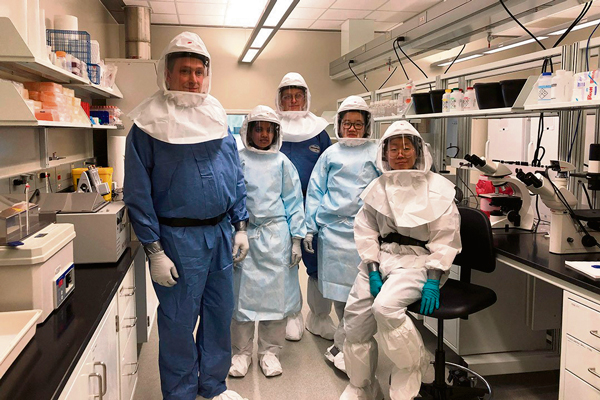
A potential COVID-19 vaccine developed in Saskatchewan is one step closer to a clinical trial.
The University of Saskatchewan’s (USask) Vaccine and Infectious Disease Organization-International Vaccine Centre (VIDO-InterVac) completed a “highly successful” experiment on ferrets last week.
According to research scientist Darryl Falzarano, the team gave the ferrets two doses, a prime and a boost, 28 days apart. Twenty-eight days after that, they infected the ferrets to see if they were protected from the virus.
“When those animals were infected, the vaccinated animals had much, much less virus in their upper respiratory tract than control animals that were not vaccinated, so that’s what we wanted to see. So really that just lets us continue on in our process,” he said.
“There’s really just a whole lot more work to do at this point. Yeah, I’m happy, but someone asked today if we’re celebrating—I don’t think we’re celebrating. It’s just a small step on a road of many, many steps.”
Vaccines train the immune system to recognize and then fight off viruses or bacteria by injecting antigens into the body, triggering an immune response.
A clinical trial for the COVID-19 vaccine, where people volunteer to test the treatment, is expected to start in the early fall.
Until then, VIDO-InterVac has much more work to do with animals. Currently, said Falzarano, they’re testing the vaccine on hamsters.
Falzarano said ferrets are one of the most common animal models for respiratory diseases, especially the flu, because they’re close to mimicking what happens in humans. However, there is no perfect model for SARS-CoV-2, the virus that causes COVID-19.
Currently, there’s no vaccine or recommended medications to treat or prevent this particular coronavirus.
The new, or novel, coronavirus was first detected in humans in Wuhan, China in December of last year.
VIDO-InterVac was quickly granted permission from the Public Health Agency of Canada to work with SARS-CoV-2, and began planning right away for a vaccine candidate. That was before the World Health Organization (WHO) even declared a global pandemic.
Researchers used a similar approach to the MERS coronavirus, said Falzarano. “We are working to ensure our COVID-19 vaccine advances as rapidly as possible,” said VIDO-InterVac Director Volker Gerdts in a news release. “Proving that the vaccine is effective in ferrets is a key milestone in the development pathway.”
According to the release, the vaccine candidate was formulated with a combination adjuvant, a component that helps vaccines work better, which was previously created in partnership with Dalhousie University, the University of British Columbia and the South Korean-based International Vaccine Institute. This was made possible with funding from the Bill and Melinda Gates Foundation.
VIDO-InterVac is also working with research groups around the world to test antivirals and therapeutics against COVID-19.

